DaviTa Everett Clinic: A Change Management Proposal for Healthcare
VerifiedAdded on 2023/04/17
|15
|3555
|246
Report
AI Summary
This report presents a change management proposal for DaviTa Everett Clinic in Washington, focusing on administration transformation and integrated care for population health. It identifies the driving forces for change, including the need for improved service efficiency and adaptation to industry advancements. The proposal anticipates resistance to change from stakeholders due to selective perceptions, security in the past, and fear of the unknown, and suggests using Field theory for managing the change process. The report emphasizes the importance of systems thinking to understand the interconnectedness of the clinic's components and ensure successful implementation of the proposed changes, ultimately aiming to enhance the clinic's performance and competitiveness in the healthcare industry.
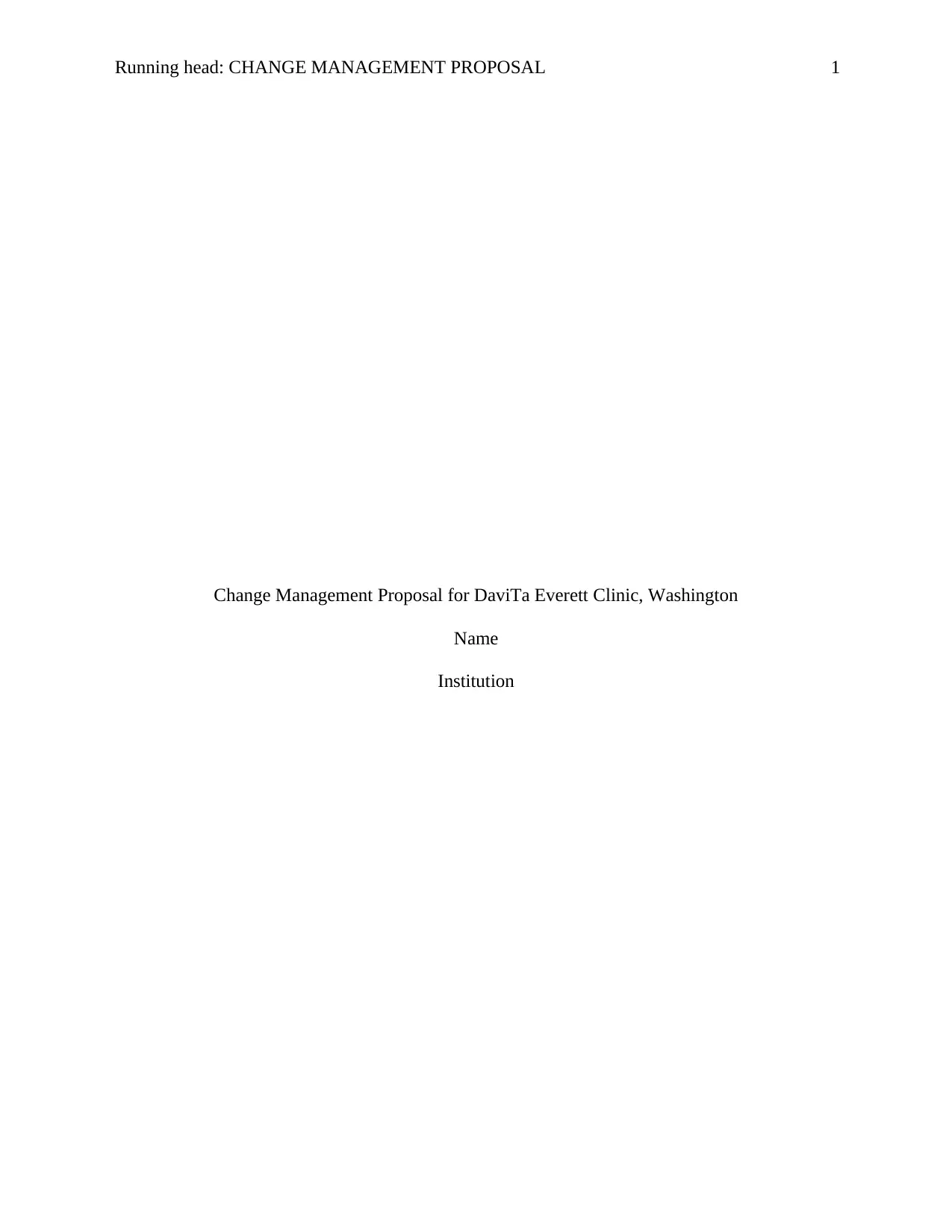
Running head: CHANGE MANAGEMENT PROPOSAL 1
Change Management Proposal for DaviTa Everett Clinic, Washington
Name
Institution
Change Management Proposal for DaviTa Everett Clinic, Washington
Name
Institution
Paraphrase This Document
Need a fresh take? Get an instant paraphrase of this document with our AI Paraphraser
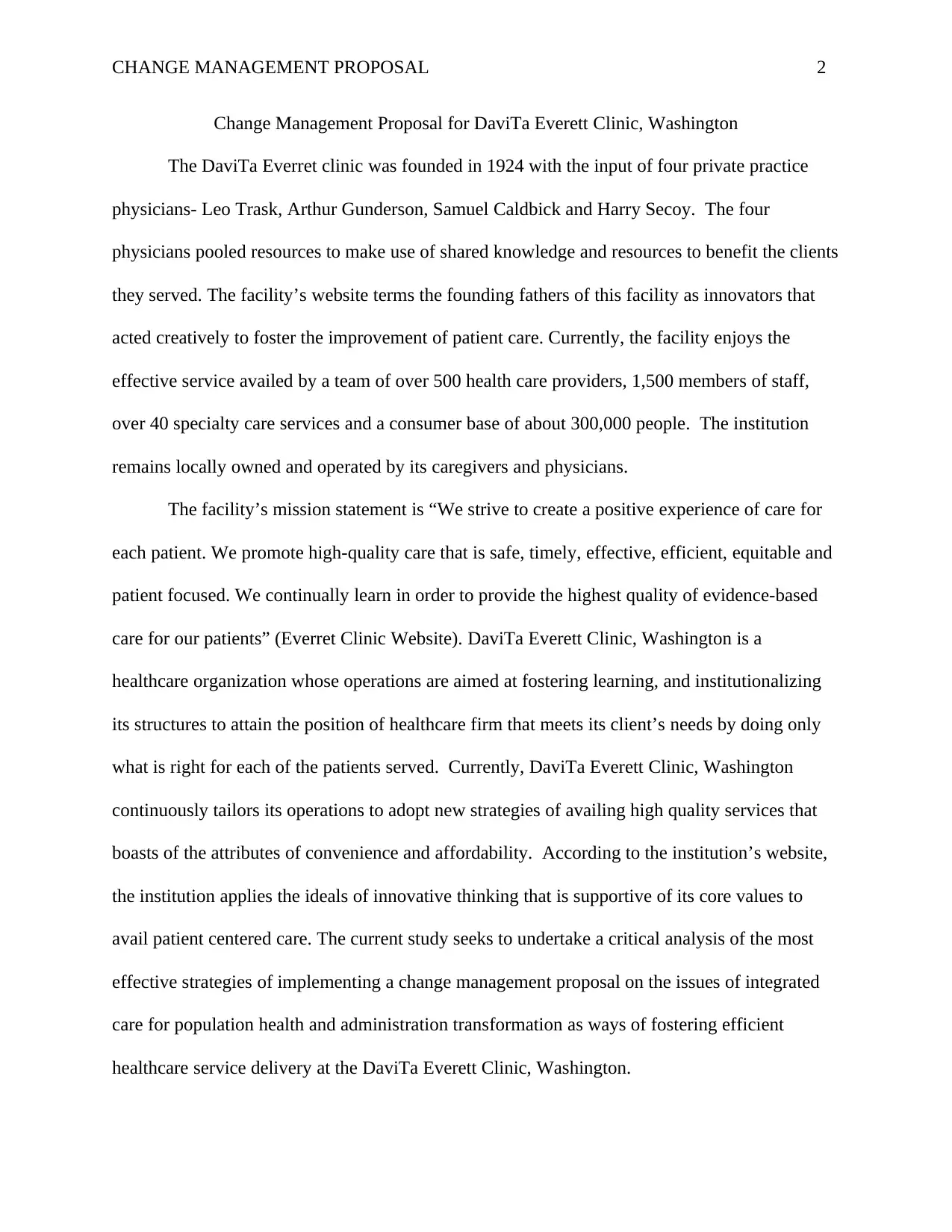
CHANGE MANAGEMENT PROPOSAL 2
Change Management Proposal for DaviTa Everett Clinic, Washington
The DaviTa Everret clinic was founded in 1924 with the input of four private practice
physicians- Leo Trask, Arthur Gunderson, Samuel Caldbick and Harry Secoy. The four
physicians pooled resources to make use of shared knowledge and resources to benefit the clients
they served. The facility’s website terms the founding fathers of this facility as innovators that
acted creatively to foster the improvement of patient care. Currently, the facility enjoys the
effective service availed by a team of over 500 health care providers, 1,500 members of staff,
over 40 specialty care services and a consumer base of about 300,000 people. The institution
remains locally owned and operated by its caregivers and physicians.
The facility’s mission statement is “We strive to create a positive experience of care for
each patient. We promote high-quality care that is safe, timely, effective, efficient, equitable and
patient focused. We continually learn in order to provide the highest quality of evidence-based
care for our patients” (Everret Clinic Website). DaviTa Everett Clinic, Washington is a
healthcare organization whose operations are aimed at fostering learning, and institutionalizing
its structures to attain the position of healthcare firm that meets its client’s needs by doing only
what is right for each of the patients served. Currently, DaviTa Everett Clinic, Washington
continuously tailors its operations to adopt new strategies of availing high quality services that
boasts of the attributes of convenience and affordability. According to the institution’s website,
the institution applies the ideals of innovative thinking that is supportive of its core values to
avail patient centered care. The current study seeks to undertake a critical analysis of the most
effective strategies of implementing a change management proposal on the issues of integrated
care for population health and administration transformation as ways of fostering efficient
healthcare service delivery at the DaviTa Everett Clinic, Washington.
Change Management Proposal for DaviTa Everett Clinic, Washington
The DaviTa Everret clinic was founded in 1924 with the input of four private practice
physicians- Leo Trask, Arthur Gunderson, Samuel Caldbick and Harry Secoy. The four
physicians pooled resources to make use of shared knowledge and resources to benefit the clients
they served. The facility’s website terms the founding fathers of this facility as innovators that
acted creatively to foster the improvement of patient care. Currently, the facility enjoys the
effective service availed by a team of over 500 health care providers, 1,500 members of staff,
over 40 specialty care services and a consumer base of about 300,000 people. The institution
remains locally owned and operated by its caregivers and physicians.
The facility’s mission statement is “We strive to create a positive experience of care for
each patient. We promote high-quality care that is safe, timely, effective, efficient, equitable and
patient focused. We continually learn in order to provide the highest quality of evidence-based
care for our patients” (Everret Clinic Website). DaviTa Everett Clinic, Washington is a
healthcare organization whose operations are aimed at fostering learning, and institutionalizing
its structures to attain the position of healthcare firm that meets its client’s needs by doing only
what is right for each of the patients served. Currently, DaviTa Everett Clinic, Washington
continuously tailors its operations to adopt new strategies of availing high quality services that
boasts of the attributes of convenience and affordability. According to the institution’s website,
the institution applies the ideals of innovative thinking that is supportive of its core values to
avail patient centered care. The current study seeks to undertake a critical analysis of the most
effective strategies of implementing a change management proposal on the issues of integrated
care for population health and administration transformation as ways of fostering efficient
healthcare service delivery at the DaviTa Everett Clinic, Washington.
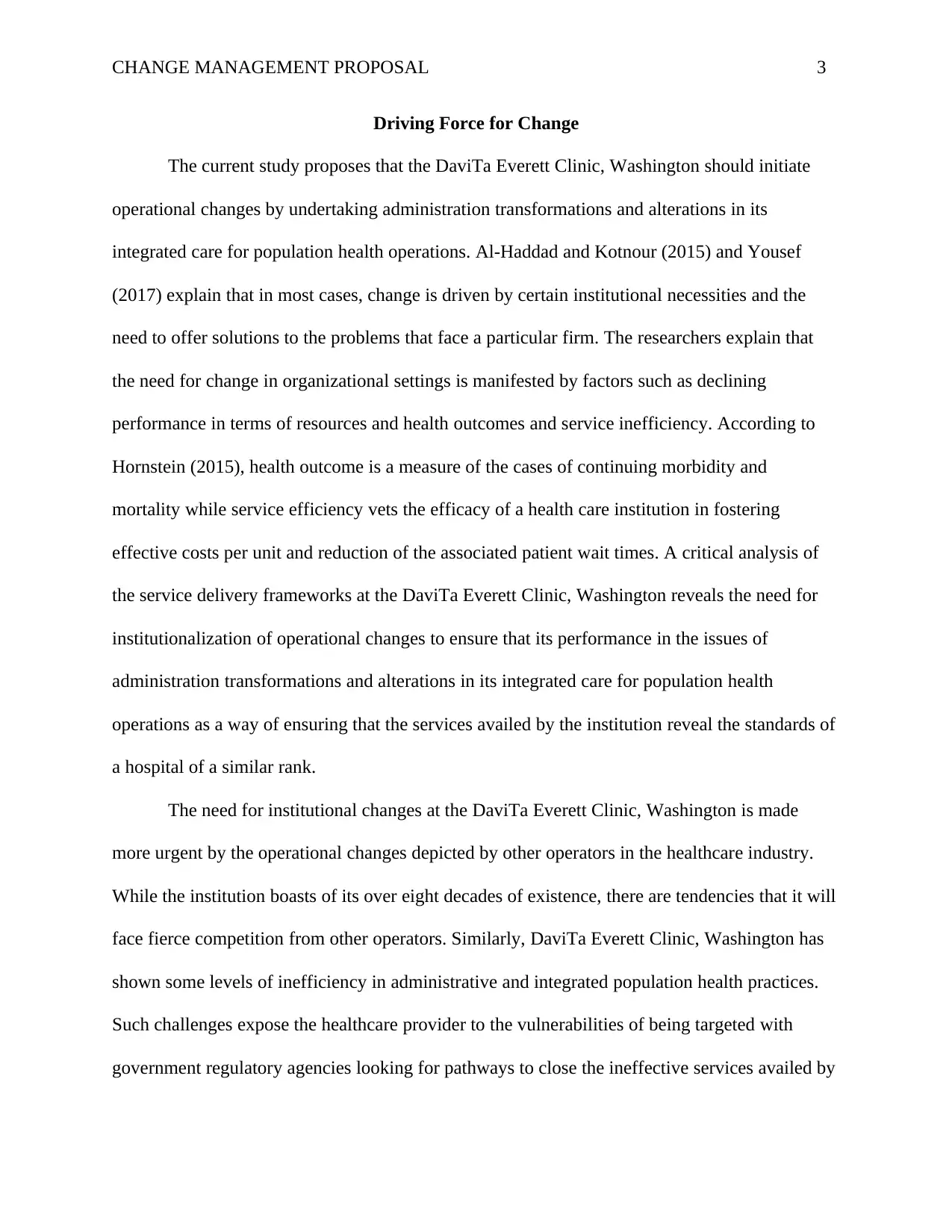
CHANGE MANAGEMENT PROPOSAL 3
Driving Force for Change
The current study proposes that the DaviTa Everett Clinic, Washington should initiate
operational changes by undertaking administration transformations and alterations in its
integrated care for population health operations. Al-Haddad and Kotnour (2015) and Yousef
(2017) explain that in most cases, change is driven by certain institutional necessities and the
need to offer solutions to the problems that face a particular firm. The researchers explain that
the need for change in organizational settings is manifested by factors such as declining
performance in terms of resources and health outcomes and service inefficiency. According to
Hornstein (2015), health outcome is a measure of the cases of continuing morbidity and
mortality while service efficiency vets the efficacy of a health care institution in fostering
effective costs per unit and reduction of the associated patient wait times. A critical analysis of
the service delivery frameworks at the DaviTa Everett Clinic, Washington reveals the need for
institutionalization of operational changes to ensure that its performance in the issues of
administration transformations and alterations in its integrated care for population health
operations as a way of ensuring that the services availed by the institution reveal the standards of
a hospital of a similar rank.
The need for institutional changes at the DaviTa Everett Clinic, Washington is made
more urgent by the operational changes depicted by other operators in the healthcare industry.
While the institution boasts of its over eight decades of existence, there are tendencies that it will
face fierce competition from other operators. Similarly, DaviTa Everett Clinic, Washington has
shown some levels of inefficiency in administrative and integrated population health practices.
Such challenges expose the healthcare provider to the vulnerabilities of being targeted with
government regulatory agencies looking for pathways to close the ineffective services availed by
Driving Force for Change
The current study proposes that the DaviTa Everett Clinic, Washington should initiate
operational changes by undertaking administration transformations and alterations in its
integrated care for population health operations. Al-Haddad and Kotnour (2015) and Yousef
(2017) explain that in most cases, change is driven by certain institutional necessities and the
need to offer solutions to the problems that face a particular firm. The researchers explain that
the need for change in organizational settings is manifested by factors such as declining
performance in terms of resources and health outcomes and service inefficiency. According to
Hornstein (2015), health outcome is a measure of the cases of continuing morbidity and
mortality while service efficiency vets the efficacy of a health care institution in fostering
effective costs per unit and reduction of the associated patient wait times. A critical analysis of
the service delivery frameworks at the DaviTa Everett Clinic, Washington reveals the need for
institutionalization of operational changes to ensure that its performance in the issues of
administration transformations and alterations in its integrated care for population health
operations as a way of ensuring that the services availed by the institution reveal the standards of
a hospital of a similar rank.
The need for institutional changes at the DaviTa Everett Clinic, Washington is made
more urgent by the operational changes depicted by other operators in the healthcare industry.
While the institution boasts of its over eight decades of existence, there are tendencies that it will
face fierce competition from other operators. Similarly, DaviTa Everett Clinic, Washington has
shown some levels of inefficiency in administrative and integrated population health practices.
Such challenges expose the healthcare provider to the vulnerabilities of being targeted with
government regulatory agencies looking for pathways to close the ineffective services availed by
⊘ This is a preview!⊘
Do you want full access?
Subscribe today to unlock all pages.

Trusted by 1+ million students worldwide
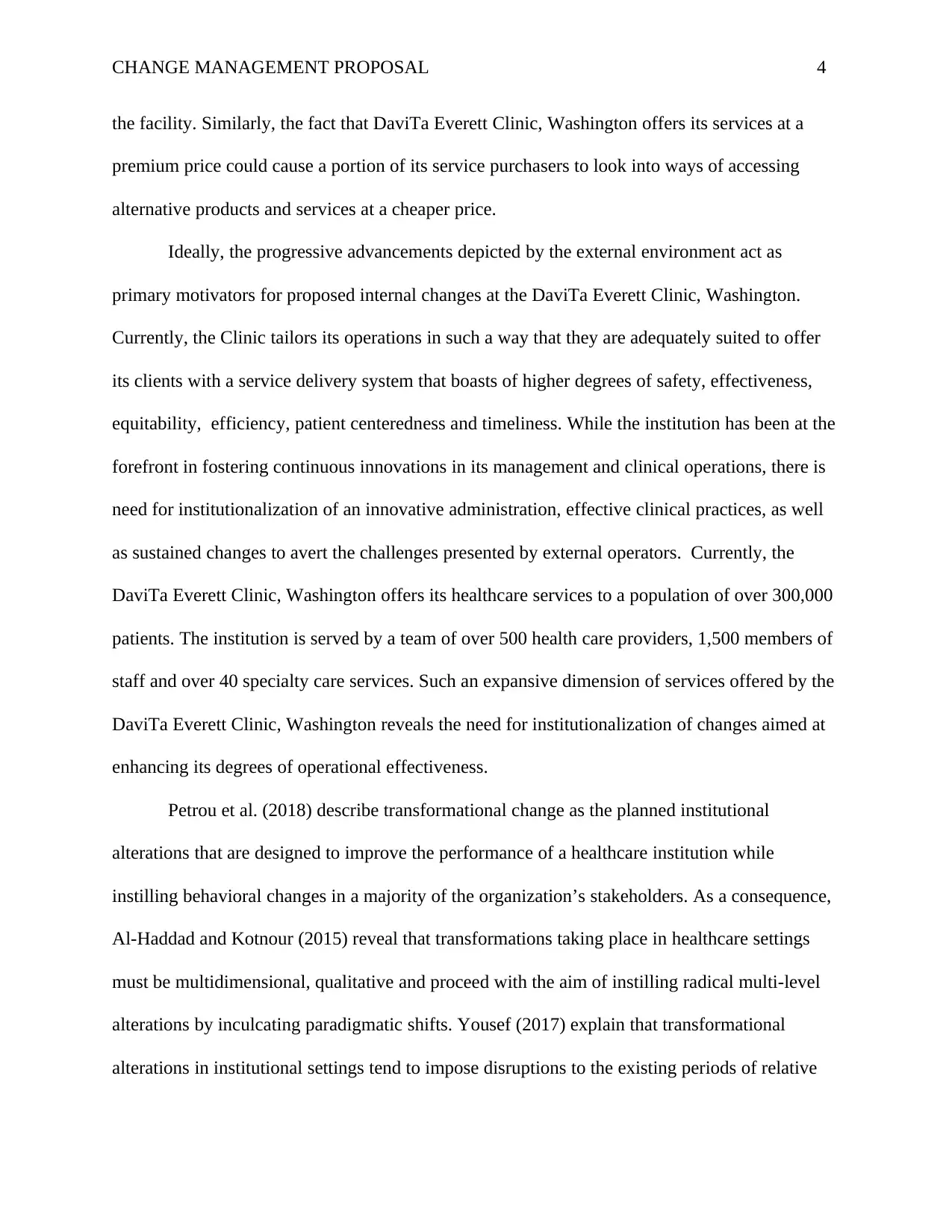
CHANGE MANAGEMENT PROPOSAL 4
the facility. Similarly, the fact that DaviTa Everett Clinic, Washington offers its services at a
premium price could cause a portion of its service purchasers to look into ways of accessing
alternative products and services at a cheaper price.
Ideally, the progressive advancements depicted by the external environment act as
primary motivators for proposed internal changes at the DaviTa Everett Clinic, Washington.
Currently, the Clinic tailors its operations in such a way that they are adequately suited to offer
its clients with a service delivery system that boasts of higher degrees of safety, effectiveness,
equitability, efficiency, patient centeredness and timeliness. While the institution has been at the
forefront in fostering continuous innovations in its management and clinical operations, there is
need for institutionalization of an innovative administration, effective clinical practices, as well
as sustained changes to avert the challenges presented by external operators. Currently, the
DaviTa Everett Clinic, Washington offers its healthcare services to a population of over 300,000
patients. The institution is served by a team of over 500 health care providers, 1,500 members of
staff and over 40 specialty care services. Such an expansive dimension of services offered by the
DaviTa Everett Clinic, Washington reveals the need for institutionalization of changes aimed at
enhancing its degrees of operational effectiveness.
Petrou et al. (2018) describe transformational change as the planned institutional
alterations that are designed to improve the performance of a healthcare institution while
instilling behavioral changes in a majority of the organization’s stakeholders. As a consequence,
Al-Haddad and Kotnour (2015) reveal that transformations taking place in healthcare settings
must be multidimensional, qualitative and proceed with the aim of instilling radical multi-level
alterations by inculcating paradigmatic shifts. Yousef (2017) explain that transformational
alterations in institutional settings tend to impose disruptions to the existing periods of relative
the facility. Similarly, the fact that DaviTa Everett Clinic, Washington offers its services at a
premium price could cause a portion of its service purchasers to look into ways of accessing
alternative products and services at a cheaper price.
Ideally, the progressive advancements depicted by the external environment act as
primary motivators for proposed internal changes at the DaviTa Everett Clinic, Washington.
Currently, the Clinic tailors its operations in such a way that they are adequately suited to offer
its clients with a service delivery system that boasts of higher degrees of safety, effectiveness,
equitability, efficiency, patient centeredness and timeliness. While the institution has been at the
forefront in fostering continuous innovations in its management and clinical operations, there is
need for institutionalization of an innovative administration, effective clinical practices, as well
as sustained changes to avert the challenges presented by external operators. Currently, the
DaviTa Everett Clinic, Washington offers its healthcare services to a population of over 300,000
patients. The institution is served by a team of over 500 health care providers, 1,500 members of
staff and over 40 specialty care services. Such an expansive dimension of services offered by the
DaviTa Everett Clinic, Washington reveals the need for institutionalization of changes aimed at
enhancing its degrees of operational effectiveness.
Petrou et al. (2018) describe transformational change as the planned institutional
alterations that are designed to improve the performance of a healthcare institution while
instilling behavioral changes in a majority of the organization’s stakeholders. As a consequence,
Al-Haddad and Kotnour (2015) reveal that transformations taking place in healthcare settings
must be multidimensional, qualitative and proceed with the aim of instilling radical multi-level
alterations by inculcating paradigmatic shifts. Yousef (2017) explain that transformational
alterations in institutional settings tend to impose disruptions to the existing periods of relative
Paraphrase This Document
Need a fresh take? Get an instant paraphrase of this document with our AI Paraphraser
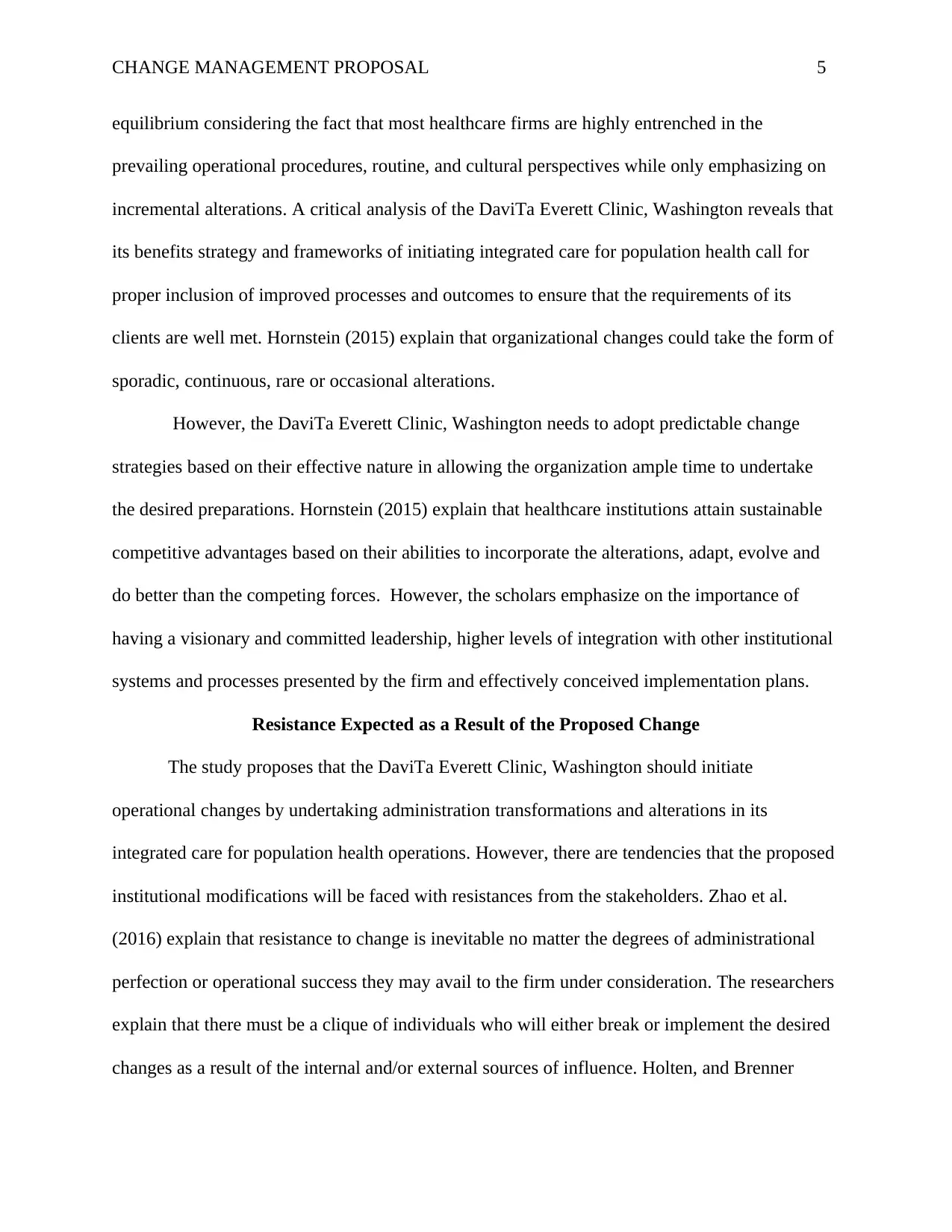
CHANGE MANAGEMENT PROPOSAL 5
equilibrium considering the fact that most healthcare firms are highly entrenched in the
prevailing operational procedures, routine, and cultural perspectives while only emphasizing on
incremental alterations. A critical analysis of the DaviTa Everett Clinic, Washington reveals that
its benefits strategy and frameworks of initiating integrated care for population health call for
proper inclusion of improved processes and outcomes to ensure that the requirements of its
clients are well met. Hornstein (2015) explain that organizational changes could take the form of
sporadic, continuous, rare or occasional alterations.
However, the DaviTa Everett Clinic, Washington needs to adopt predictable change
strategies based on their effective nature in allowing the organization ample time to undertake
the desired preparations. Hornstein (2015) explain that healthcare institutions attain sustainable
competitive advantages based on their abilities to incorporate the alterations, adapt, evolve and
do better than the competing forces. However, the scholars emphasize on the importance of
having a visionary and committed leadership, higher levels of integration with other institutional
systems and processes presented by the firm and effectively conceived implementation plans.
Resistance Expected as a Result of the Proposed Change
The study proposes that the DaviTa Everett Clinic, Washington should initiate
operational changes by undertaking administration transformations and alterations in its
integrated care for population health operations. However, there are tendencies that the proposed
institutional modifications will be faced with resistances from the stakeholders. Zhao et al.
(2016) explain that resistance to change is inevitable no matter the degrees of administrational
perfection or operational success they may avail to the firm under consideration. The researchers
explain that there must be a clique of individuals who will either break or implement the desired
changes as a result of the internal and/or external sources of influence. Holten, and Brenner
equilibrium considering the fact that most healthcare firms are highly entrenched in the
prevailing operational procedures, routine, and cultural perspectives while only emphasizing on
incremental alterations. A critical analysis of the DaviTa Everett Clinic, Washington reveals that
its benefits strategy and frameworks of initiating integrated care for population health call for
proper inclusion of improved processes and outcomes to ensure that the requirements of its
clients are well met. Hornstein (2015) explain that organizational changes could take the form of
sporadic, continuous, rare or occasional alterations.
However, the DaviTa Everett Clinic, Washington needs to adopt predictable change
strategies based on their effective nature in allowing the organization ample time to undertake
the desired preparations. Hornstein (2015) explain that healthcare institutions attain sustainable
competitive advantages based on their abilities to incorporate the alterations, adapt, evolve and
do better than the competing forces. However, the scholars emphasize on the importance of
having a visionary and committed leadership, higher levels of integration with other institutional
systems and processes presented by the firm and effectively conceived implementation plans.
Resistance Expected as a Result of the Proposed Change
The study proposes that the DaviTa Everett Clinic, Washington should initiate
operational changes by undertaking administration transformations and alterations in its
integrated care for population health operations. However, there are tendencies that the proposed
institutional modifications will be faced with resistances from the stakeholders. Zhao et al.
(2016) explain that resistance to change is inevitable no matter the degrees of administrational
perfection or operational success they may avail to the firm under consideration. The researchers
explain that there must be a clique of individuals who will either break or implement the desired
changes as a result of the internal and/or external sources of influence. Holten, and Brenner
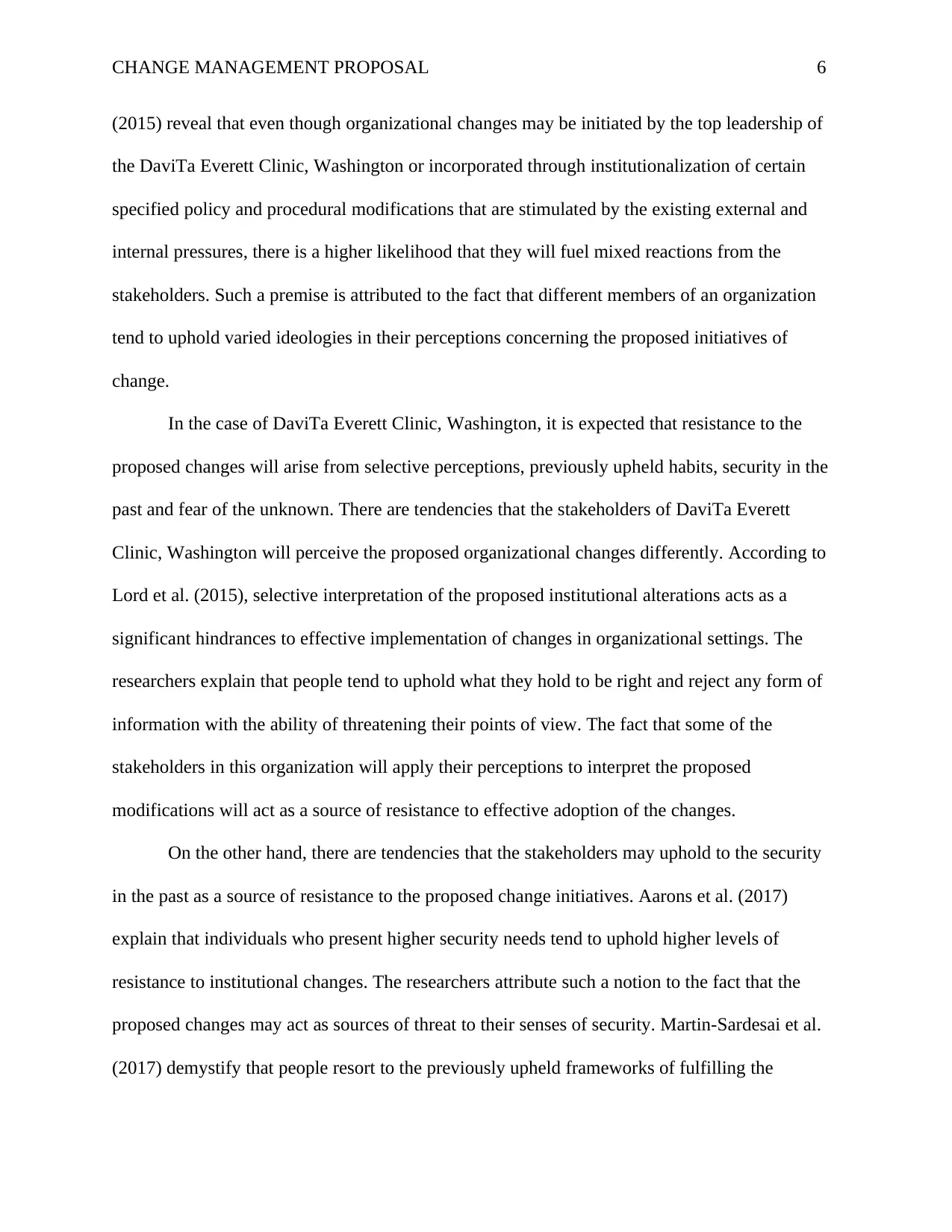
CHANGE MANAGEMENT PROPOSAL 6
(2015) reveal that even though organizational changes may be initiated by the top leadership of
the DaviTa Everett Clinic, Washington or incorporated through institutionalization of certain
specified policy and procedural modifications that are stimulated by the existing external and
internal pressures, there is a higher likelihood that they will fuel mixed reactions from the
stakeholders. Such a premise is attributed to the fact that different members of an organization
tend to uphold varied ideologies in their perceptions concerning the proposed initiatives of
change.
In the case of DaviTa Everett Clinic, Washington, it is expected that resistance to the
proposed changes will arise from selective perceptions, previously upheld habits, security in the
past and fear of the unknown. There are tendencies that the stakeholders of DaviTa Everett
Clinic, Washington will perceive the proposed organizational changes differently. According to
Lord et al. (2015), selective interpretation of the proposed institutional alterations acts as a
significant hindrances to effective implementation of changes in organizational settings. The
researchers explain that people tend to uphold what they hold to be right and reject any form of
information with the ability of threatening their points of view. The fact that some of the
stakeholders in this organization will apply their perceptions to interpret the proposed
modifications will act as a source of resistance to effective adoption of the changes.
On the other hand, there are tendencies that the stakeholders may uphold to the security
in the past as a source of resistance to the proposed change initiatives. Aarons et al. (2017)
explain that individuals who present higher security needs tend to uphold higher levels of
resistance to institutional changes. The researchers attribute such a notion to the fact that the
proposed changes may act as sources of threat to their senses of security. Martin-Sardesai et al.
(2017) demystify that people resort to the previously upheld frameworks of fulfilling the
(2015) reveal that even though organizational changes may be initiated by the top leadership of
the DaviTa Everett Clinic, Washington or incorporated through institutionalization of certain
specified policy and procedural modifications that are stimulated by the existing external and
internal pressures, there is a higher likelihood that they will fuel mixed reactions from the
stakeholders. Such a premise is attributed to the fact that different members of an organization
tend to uphold varied ideologies in their perceptions concerning the proposed initiatives of
change.
In the case of DaviTa Everett Clinic, Washington, it is expected that resistance to the
proposed changes will arise from selective perceptions, previously upheld habits, security in the
past and fear of the unknown. There are tendencies that the stakeholders of DaviTa Everett
Clinic, Washington will perceive the proposed organizational changes differently. According to
Lord et al. (2015), selective interpretation of the proposed institutional alterations acts as a
significant hindrances to effective implementation of changes in organizational settings. The
researchers explain that people tend to uphold what they hold to be right and reject any form of
information with the ability of threatening their points of view. The fact that some of the
stakeholders in this organization will apply their perceptions to interpret the proposed
modifications will act as a source of resistance to effective adoption of the changes.
On the other hand, there are tendencies that the stakeholders may uphold to the security
in the past as a source of resistance to the proposed change initiatives. Aarons et al. (2017)
explain that individuals who present higher security needs tend to uphold higher levels of
resistance to institutional changes. The researchers attribute such a notion to the fact that the
proposed changes may act as sources of threat to their senses of security. Martin-Sardesai et al.
(2017) demystify that people resort to the previously upheld frameworks of fulfilling the
⊘ This is a preview!⊘
Do you want full access?
Subscribe today to unlock all pages.

Trusted by 1+ million students worldwide
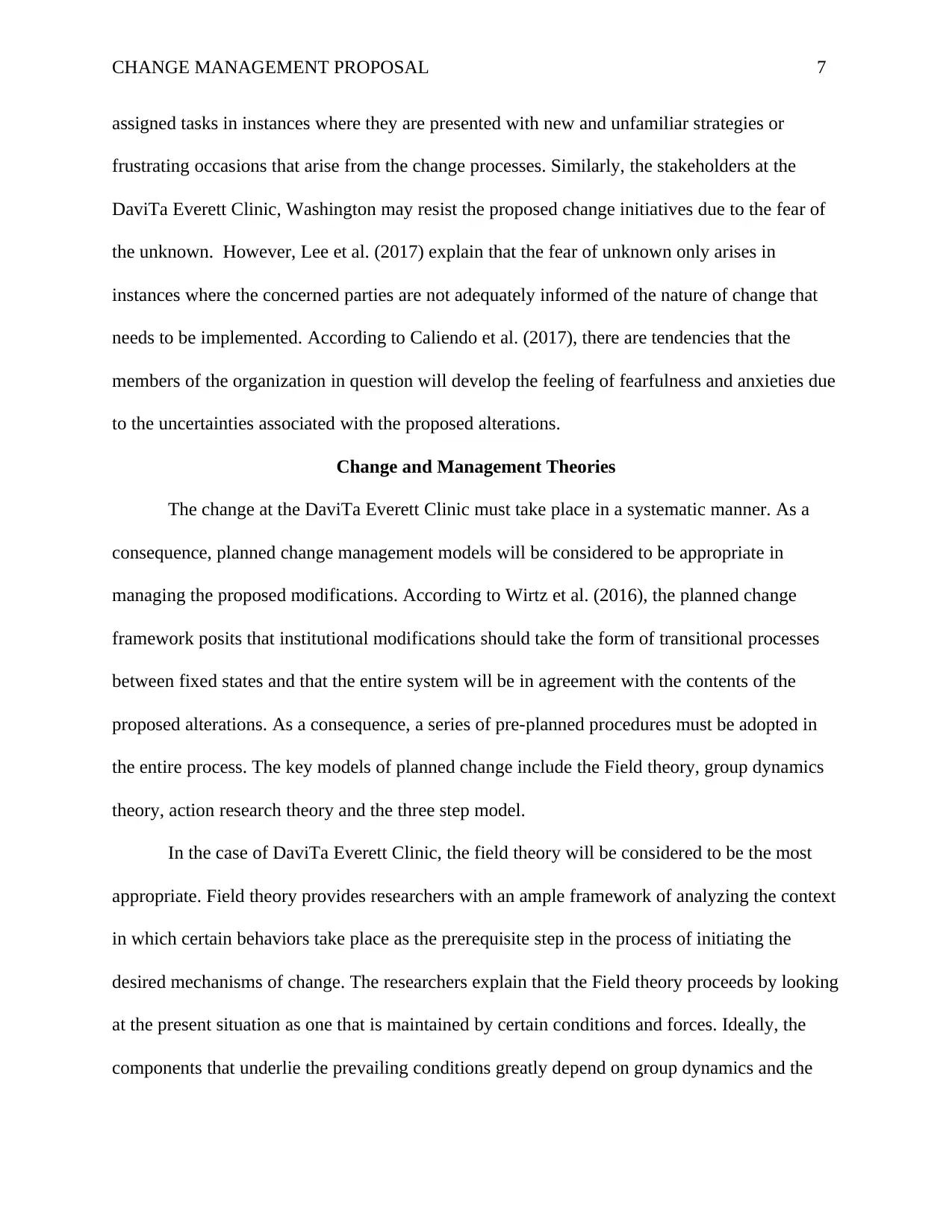
CHANGE MANAGEMENT PROPOSAL 7
assigned tasks in instances where they are presented with new and unfamiliar strategies or
frustrating occasions that arise from the change processes. Similarly, the stakeholders at the
DaviTa Everett Clinic, Washington may resist the proposed change initiatives due to the fear of
the unknown. However, Lee et al. (2017) explain that the fear of unknown only arises in
instances where the concerned parties are not adequately informed of the nature of change that
needs to be implemented. According to Caliendo et al. (2017), there are tendencies that the
members of the organization in question will develop the feeling of fearfulness and anxieties due
to the uncertainties associated with the proposed alterations.
Change and Management Theories
The change at the DaviTa Everett Clinic must take place in a systematic manner. As a
consequence, planned change management models will be considered to be appropriate in
managing the proposed modifications. According to Wirtz et al. (2016), the planned change
framework posits that institutional modifications should take the form of transitional processes
between fixed states and that the entire system will be in agreement with the contents of the
proposed alterations. As a consequence, a series of pre-planned procedures must be adopted in
the entire process. The key models of planned change include the Field theory, group dynamics
theory, action research theory and the three step model.
In the case of DaviTa Everett Clinic, the field theory will be considered to be the most
appropriate. Field theory provides researchers with an ample framework of analyzing the context
in which certain behaviors take place as the prerequisite step in the process of initiating the
desired mechanisms of change. The researchers explain that the Field theory proceeds by looking
at the present situation as one that is maintained by certain conditions and forces. Ideally, the
components that underlie the prevailing conditions greatly depend on group dynamics and the
assigned tasks in instances where they are presented with new and unfamiliar strategies or
frustrating occasions that arise from the change processes. Similarly, the stakeholders at the
DaviTa Everett Clinic, Washington may resist the proposed change initiatives due to the fear of
the unknown. However, Lee et al. (2017) explain that the fear of unknown only arises in
instances where the concerned parties are not adequately informed of the nature of change that
needs to be implemented. According to Caliendo et al. (2017), there are tendencies that the
members of the organization in question will develop the feeling of fearfulness and anxieties due
to the uncertainties associated with the proposed alterations.
Change and Management Theories
The change at the DaviTa Everett Clinic must take place in a systematic manner. As a
consequence, planned change management models will be considered to be appropriate in
managing the proposed modifications. According to Wirtz et al. (2016), the planned change
framework posits that institutional modifications should take the form of transitional processes
between fixed states and that the entire system will be in agreement with the contents of the
proposed alterations. As a consequence, a series of pre-planned procedures must be adopted in
the entire process. The key models of planned change include the Field theory, group dynamics
theory, action research theory and the three step model.
In the case of DaviTa Everett Clinic, the field theory will be considered to be the most
appropriate. Field theory provides researchers with an ample framework of analyzing the context
in which certain behaviors take place as the prerequisite step in the process of initiating the
desired mechanisms of change. The researchers explain that the Field theory proceeds by looking
at the present situation as one that is maintained by certain conditions and forces. Ideally, the
components that underlie the prevailing conditions greatly depend on group dynamics and the
Paraphrase This Document
Need a fresh take? Get an instant paraphrase of this document with our AI Paraphraser
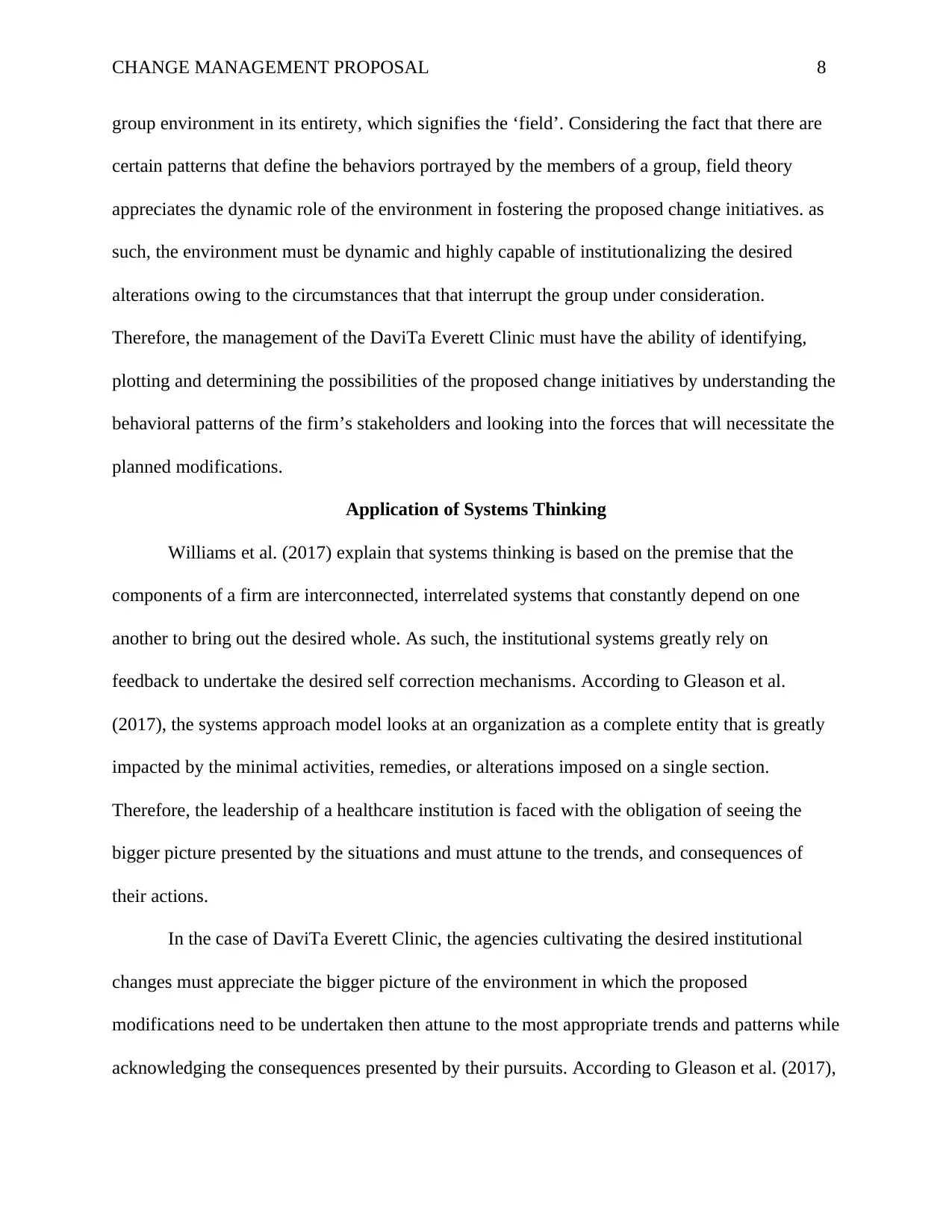
CHANGE MANAGEMENT PROPOSAL 8
group environment in its entirety, which signifies the ‘field’. Considering the fact that there are
certain patterns that define the behaviors portrayed by the members of a group, field theory
appreciates the dynamic role of the environment in fostering the proposed change initiatives. as
such, the environment must be dynamic and highly capable of institutionalizing the desired
alterations owing to the circumstances that that interrupt the group under consideration.
Therefore, the management of the DaviTa Everett Clinic must have the ability of identifying,
plotting and determining the possibilities of the proposed change initiatives by understanding the
behavioral patterns of the firm’s stakeholders and looking into the forces that will necessitate the
planned modifications.
Application of Systems Thinking
Williams et al. (2017) explain that systems thinking is based on the premise that the
components of a firm are interconnected, interrelated systems that constantly depend on one
another to bring out the desired whole. As such, the institutional systems greatly rely on
feedback to undertake the desired self correction mechanisms. According to Gleason et al.
(2017), the systems approach model looks at an organization as a complete entity that is greatly
impacted by the minimal activities, remedies, or alterations imposed on a single section.
Therefore, the leadership of a healthcare institution is faced with the obligation of seeing the
bigger picture presented by the situations and must attune to the trends, and consequences of
their actions.
In the case of DaviTa Everett Clinic, the agencies cultivating the desired institutional
changes must appreciate the bigger picture of the environment in which the proposed
modifications need to be undertaken then attune to the most appropriate trends and patterns while
acknowledging the consequences presented by their pursuits. According to Gleason et al. (2017),
group environment in its entirety, which signifies the ‘field’. Considering the fact that there are
certain patterns that define the behaviors portrayed by the members of a group, field theory
appreciates the dynamic role of the environment in fostering the proposed change initiatives. as
such, the environment must be dynamic and highly capable of institutionalizing the desired
alterations owing to the circumstances that that interrupt the group under consideration.
Therefore, the management of the DaviTa Everett Clinic must have the ability of identifying,
plotting and determining the possibilities of the proposed change initiatives by understanding the
behavioral patterns of the firm’s stakeholders and looking into the forces that will necessitate the
planned modifications.
Application of Systems Thinking
Williams et al. (2017) explain that systems thinking is based on the premise that the
components of a firm are interconnected, interrelated systems that constantly depend on one
another to bring out the desired whole. As such, the institutional systems greatly rely on
feedback to undertake the desired self correction mechanisms. According to Gleason et al.
(2017), the systems approach model looks at an organization as a complete entity that is greatly
impacted by the minimal activities, remedies, or alterations imposed on a single section.
Therefore, the leadership of a healthcare institution is faced with the obligation of seeing the
bigger picture presented by the situations and must attune to the trends, and consequences of
their actions.
In the case of DaviTa Everett Clinic, the agencies cultivating the desired institutional
changes must appreciate the bigger picture of the environment in which the proposed
modifications need to be undertaken then attune to the most appropriate trends and patterns while
acknowledging the consequences presented by their pursuits. According to Gleason et al. (2017),
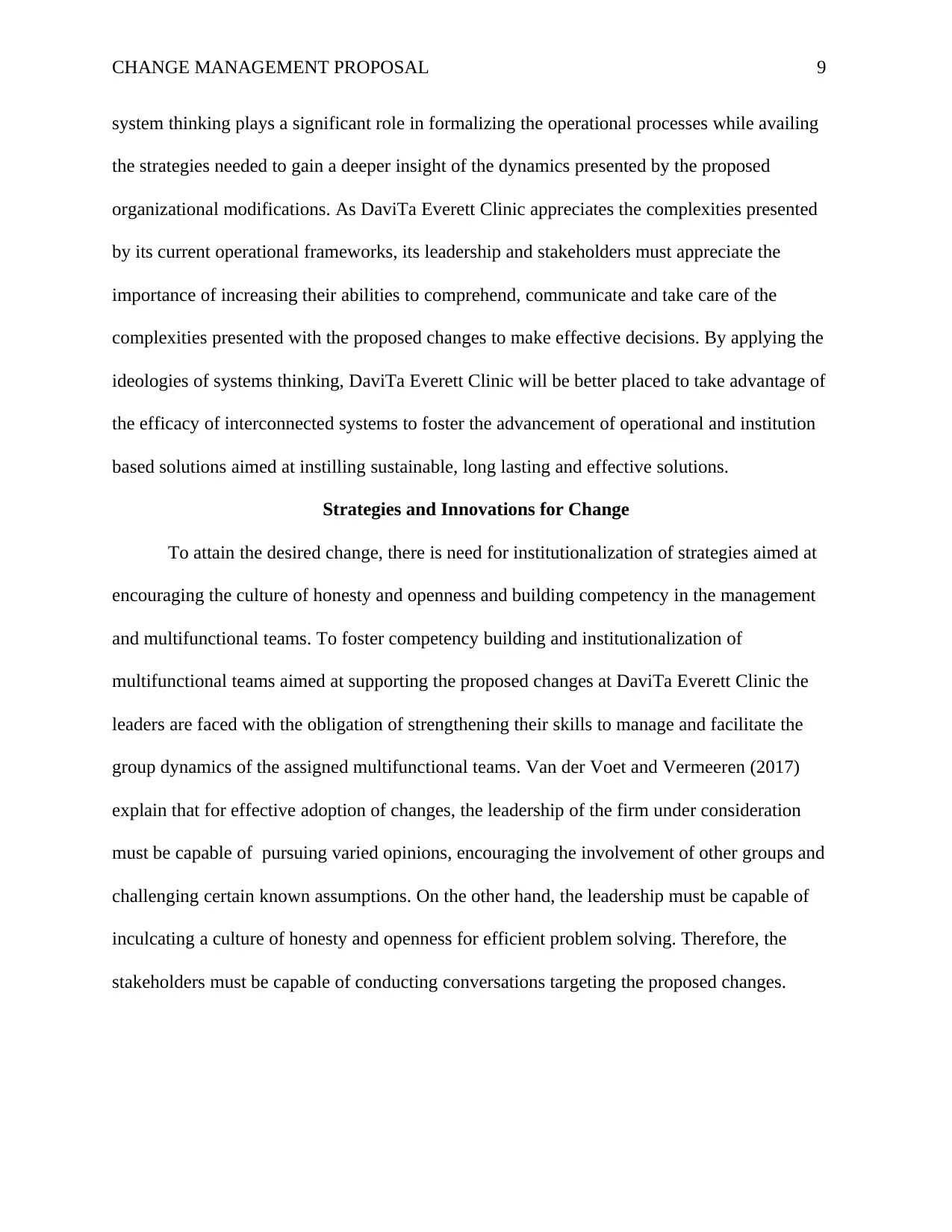
CHANGE MANAGEMENT PROPOSAL 9
system thinking plays a significant role in formalizing the operational processes while availing
the strategies needed to gain a deeper insight of the dynamics presented by the proposed
organizational modifications. As DaviTa Everett Clinic appreciates the complexities presented
by its current operational frameworks, its leadership and stakeholders must appreciate the
importance of increasing their abilities to comprehend, communicate and take care of the
complexities presented with the proposed changes to make effective decisions. By applying the
ideologies of systems thinking, DaviTa Everett Clinic will be better placed to take advantage of
the efficacy of interconnected systems to foster the advancement of operational and institution
based solutions aimed at instilling sustainable, long lasting and effective solutions.
Strategies and Innovations for Change
To attain the desired change, there is need for institutionalization of strategies aimed at
encouraging the culture of honesty and openness and building competency in the management
and multifunctional teams. To foster competency building and institutionalization of
multifunctional teams aimed at supporting the proposed changes at DaviTa Everett Clinic the
leaders are faced with the obligation of strengthening their skills to manage and facilitate the
group dynamics of the assigned multifunctional teams. Van der Voet and Vermeeren (2017)
explain that for effective adoption of changes, the leadership of the firm under consideration
must be capable of pursuing varied opinions, encouraging the involvement of other groups and
challenging certain known assumptions. On the other hand, the leadership must be capable of
inculcating a culture of honesty and openness for efficient problem solving. Therefore, the
stakeholders must be capable of conducting conversations targeting the proposed changes.
system thinking plays a significant role in formalizing the operational processes while availing
the strategies needed to gain a deeper insight of the dynamics presented by the proposed
organizational modifications. As DaviTa Everett Clinic appreciates the complexities presented
by its current operational frameworks, its leadership and stakeholders must appreciate the
importance of increasing their abilities to comprehend, communicate and take care of the
complexities presented with the proposed changes to make effective decisions. By applying the
ideologies of systems thinking, DaviTa Everett Clinic will be better placed to take advantage of
the efficacy of interconnected systems to foster the advancement of operational and institution
based solutions aimed at instilling sustainable, long lasting and effective solutions.
Strategies and Innovations for Change
To attain the desired change, there is need for institutionalization of strategies aimed at
encouraging the culture of honesty and openness and building competency in the management
and multifunctional teams. To foster competency building and institutionalization of
multifunctional teams aimed at supporting the proposed changes at DaviTa Everett Clinic the
leaders are faced with the obligation of strengthening their skills to manage and facilitate the
group dynamics of the assigned multifunctional teams. Van der Voet and Vermeeren (2017)
explain that for effective adoption of changes, the leadership of the firm under consideration
must be capable of pursuing varied opinions, encouraging the involvement of other groups and
challenging certain known assumptions. On the other hand, the leadership must be capable of
inculcating a culture of honesty and openness for efficient problem solving. Therefore, the
stakeholders must be capable of conducting conversations targeting the proposed changes.
⊘ This is a preview!⊘
Do you want full access?
Subscribe today to unlock all pages.

Trusted by 1+ million students worldwide
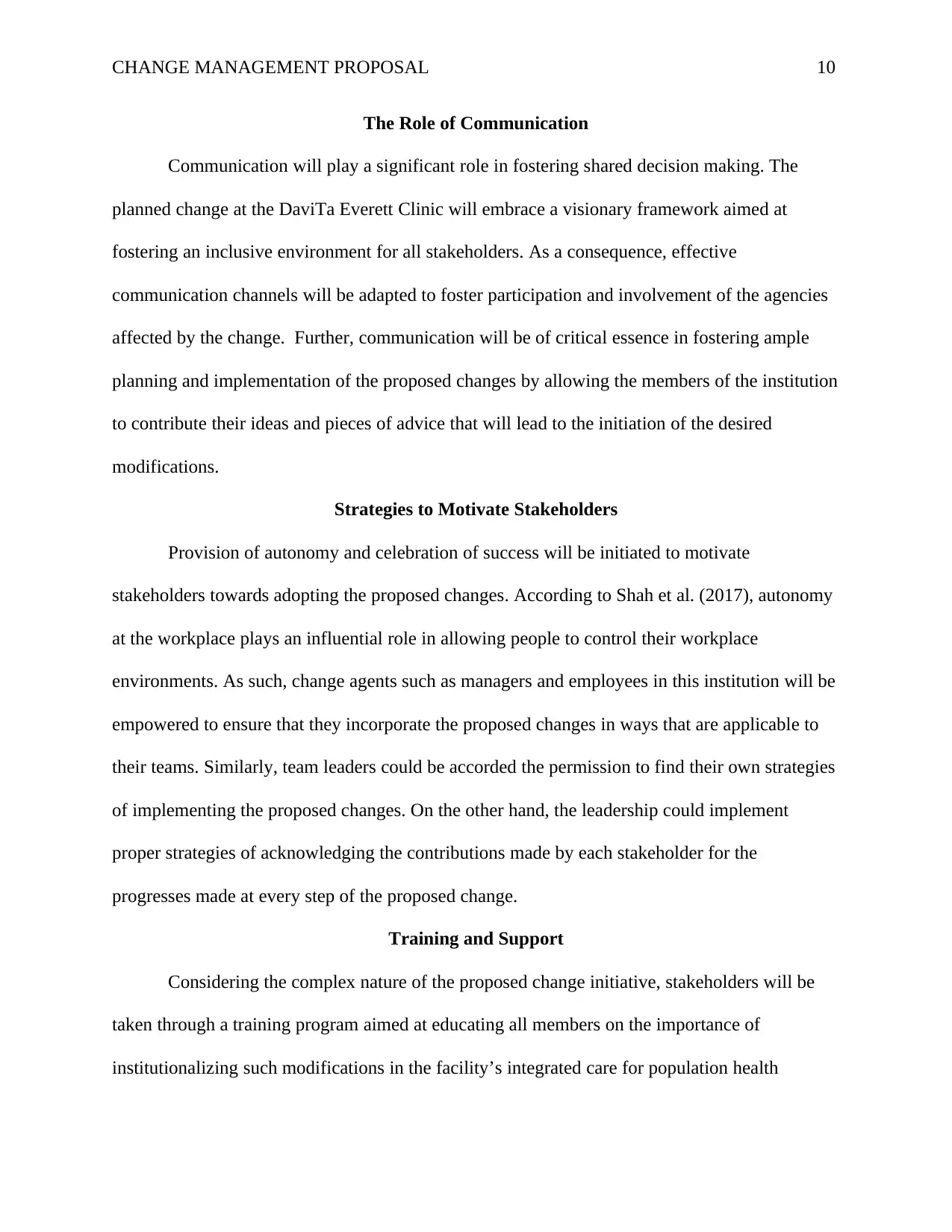
CHANGE MANAGEMENT PROPOSAL 10
The Role of Communication
Communication will play a significant role in fostering shared decision making. The
planned change at the DaviTa Everett Clinic will embrace a visionary framework aimed at
fostering an inclusive environment for all stakeholders. As a consequence, effective
communication channels will be adapted to foster participation and involvement of the agencies
affected by the change. Further, communication will be of critical essence in fostering ample
planning and implementation of the proposed changes by allowing the members of the institution
to contribute their ideas and pieces of advice that will lead to the initiation of the desired
modifications.
Strategies to Motivate Stakeholders
Provision of autonomy and celebration of success will be initiated to motivate
stakeholders towards adopting the proposed changes. According to Shah et al. (2017), autonomy
at the workplace plays an influential role in allowing people to control their workplace
environments. As such, change agents such as managers and employees in this institution will be
empowered to ensure that they incorporate the proposed changes in ways that are applicable to
their teams. Similarly, team leaders could be accorded the permission to find their own strategies
of implementing the proposed changes. On the other hand, the leadership could implement
proper strategies of acknowledging the contributions made by each stakeholder for the
progresses made at every step of the proposed change.
Training and Support
Considering the complex nature of the proposed change initiative, stakeholders will be
taken through a training program aimed at educating all members on the importance of
institutionalizing such modifications in the facility’s integrated care for population health
The Role of Communication
Communication will play a significant role in fostering shared decision making. The
planned change at the DaviTa Everett Clinic will embrace a visionary framework aimed at
fostering an inclusive environment for all stakeholders. As a consequence, effective
communication channels will be adapted to foster participation and involvement of the agencies
affected by the change. Further, communication will be of critical essence in fostering ample
planning and implementation of the proposed changes by allowing the members of the institution
to contribute their ideas and pieces of advice that will lead to the initiation of the desired
modifications.
Strategies to Motivate Stakeholders
Provision of autonomy and celebration of success will be initiated to motivate
stakeholders towards adopting the proposed changes. According to Shah et al. (2017), autonomy
at the workplace plays an influential role in allowing people to control their workplace
environments. As such, change agents such as managers and employees in this institution will be
empowered to ensure that they incorporate the proposed changes in ways that are applicable to
their teams. Similarly, team leaders could be accorded the permission to find their own strategies
of implementing the proposed changes. On the other hand, the leadership could implement
proper strategies of acknowledging the contributions made by each stakeholder for the
progresses made at every step of the proposed change.
Training and Support
Considering the complex nature of the proposed change initiative, stakeholders will be
taken through a training program aimed at educating all members on the importance of
institutionalizing such modifications in the facility’s integrated care for population health
Paraphrase This Document
Need a fresh take? Get an instant paraphrase of this document with our AI Paraphraser
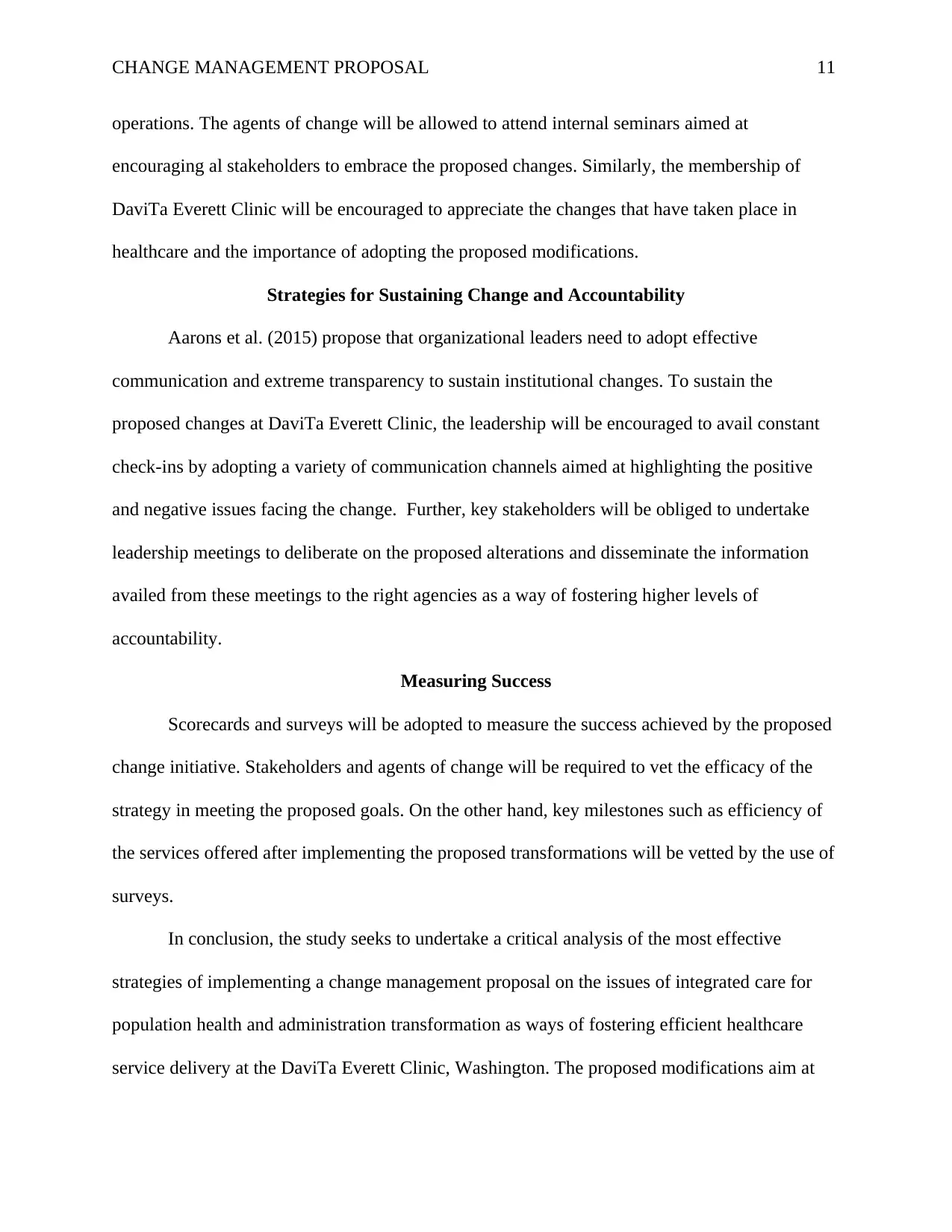
CHANGE MANAGEMENT PROPOSAL 11
operations. The agents of change will be allowed to attend internal seminars aimed at
encouraging al stakeholders to embrace the proposed changes. Similarly, the membership of
DaviTa Everett Clinic will be encouraged to appreciate the changes that have taken place in
healthcare and the importance of adopting the proposed modifications.
Strategies for Sustaining Change and Accountability
Aarons et al. (2015) propose that organizational leaders need to adopt effective
communication and extreme transparency to sustain institutional changes. To sustain the
proposed changes at DaviTa Everett Clinic, the leadership will be encouraged to avail constant
check-ins by adopting a variety of communication channels aimed at highlighting the positive
and negative issues facing the change. Further, key stakeholders will be obliged to undertake
leadership meetings to deliberate on the proposed alterations and disseminate the information
availed from these meetings to the right agencies as a way of fostering higher levels of
accountability.
Measuring Success
Scorecards and surveys will be adopted to measure the success achieved by the proposed
change initiative. Stakeholders and agents of change will be required to vet the efficacy of the
strategy in meeting the proposed goals. On the other hand, key milestones such as efficiency of
the services offered after implementing the proposed transformations will be vetted by the use of
surveys.
In conclusion, the study seeks to undertake a critical analysis of the most effective
strategies of implementing a change management proposal on the issues of integrated care for
population health and administration transformation as ways of fostering efficient healthcare
service delivery at the DaviTa Everett Clinic, Washington. The proposed modifications aim at
operations. The agents of change will be allowed to attend internal seminars aimed at
encouraging al stakeholders to embrace the proposed changes. Similarly, the membership of
DaviTa Everett Clinic will be encouraged to appreciate the changes that have taken place in
healthcare and the importance of adopting the proposed modifications.
Strategies for Sustaining Change and Accountability
Aarons et al. (2015) propose that organizational leaders need to adopt effective
communication and extreme transparency to sustain institutional changes. To sustain the
proposed changes at DaviTa Everett Clinic, the leadership will be encouraged to avail constant
check-ins by adopting a variety of communication channels aimed at highlighting the positive
and negative issues facing the change. Further, key stakeholders will be obliged to undertake
leadership meetings to deliberate on the proposed alterations and disseminate the information
availed from these meetings to the right agencies as a way of fostering higher levels of
accountability.
Measuring Success
Scorecards and surveys will be adopted to measure the success achieved by the proposed
change initiative. Stakeholders and agents of change will be required to vet the efficacy of the
strategy in meeting the proposed goals. On the other hand, key milestones such as efficiency of
the services offered after implementing the proposed transformations will be vetted by the use of
surveys.
In conclusion, the study seeks to undertake a critical analysis of the most effective
strategies of implementing a change management proposal on the issues of integrated care for
population health and administration transformation as ways of fostering efficient healthcare
service delivery at the DaviTa Everett Clinic, Washington. The proposed modifications aim at
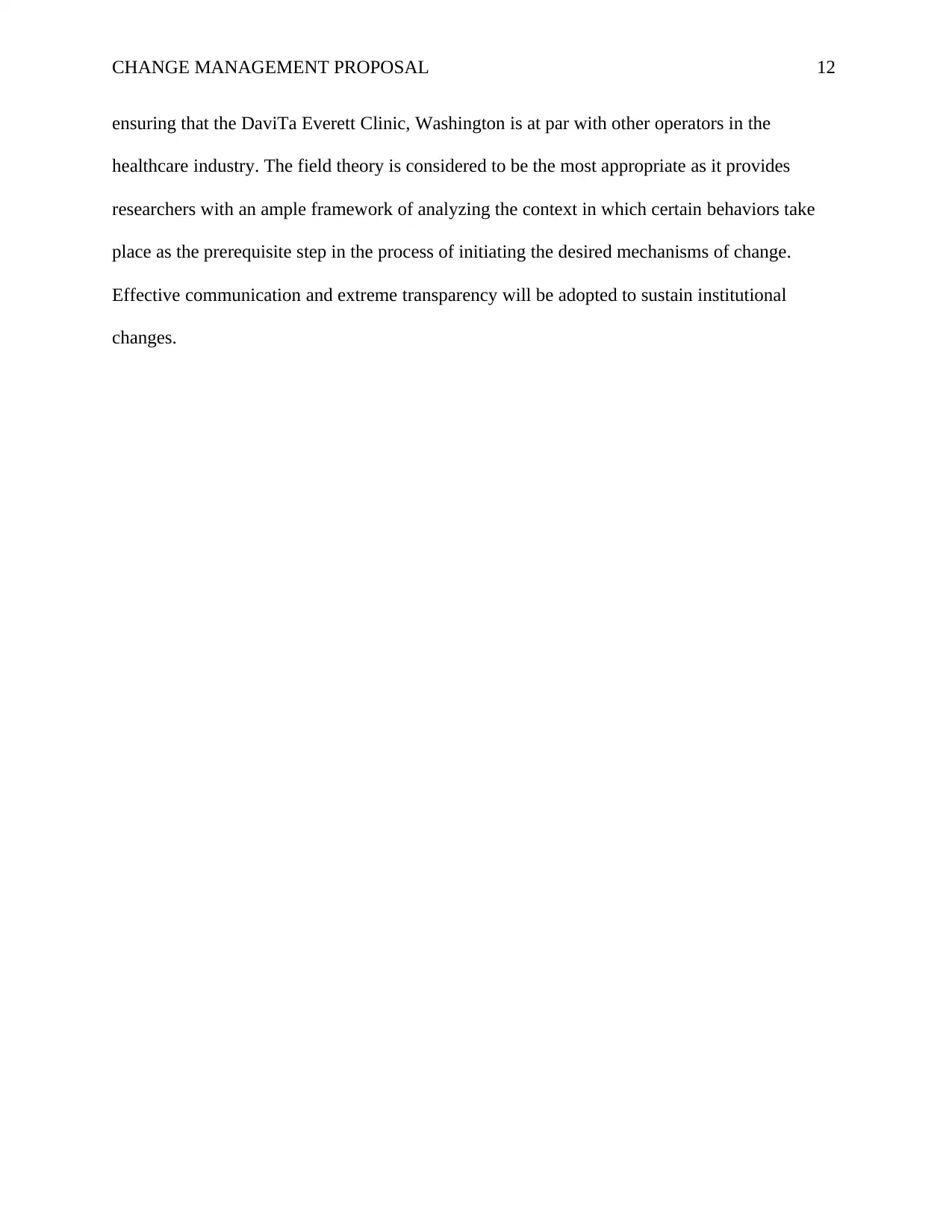
CHANGE MANAGEMENT PROPOSAL 12
ensuring that the DaviTa Everett Clinic, Washington is at par with other operators in the
healthcare industry. The field theory is considered to be the most appropriate as it provides
researchers with an ample framework of analyzing the context in which certain behaviors take
place as the prerequisite step in the process of initiating the desired mechanisms of change.
Effective communication and extreme transparency will be adopted to sustain institutional
changes.
ensuring that the DaviTa Everett Clinic, Washington is at par with other operators in the
healthcare industry. The field theory is considered to be the most appropriate as it provides
researchers with an ample framework of analyzing the context in which certain behaviors take
place as the prerequisite step in the process of initiating the desired mechanisms of change.
Effective communication and extreme transparency will be adopted to sustain institutional
changes.
⊘ This is a preview!⊘
Do you want full access?
Subscribe today to unlock all pages.

Trusted by 1+ million students worldwide
1 out of 15
Related Documents
Your All-in-One AI-Powered Toolkit for Academic Success.
+13062052269
info@desklib.com
Available 24*7 on WhatsApp / Email
![[object Object]](/_next/static/media/star-bottom.7253800d.svg)
Unlock your academic potential
Copyright © 2020–2026 A2Z Services. All Rights Reserved. Developed and managed by ZUCOL.





